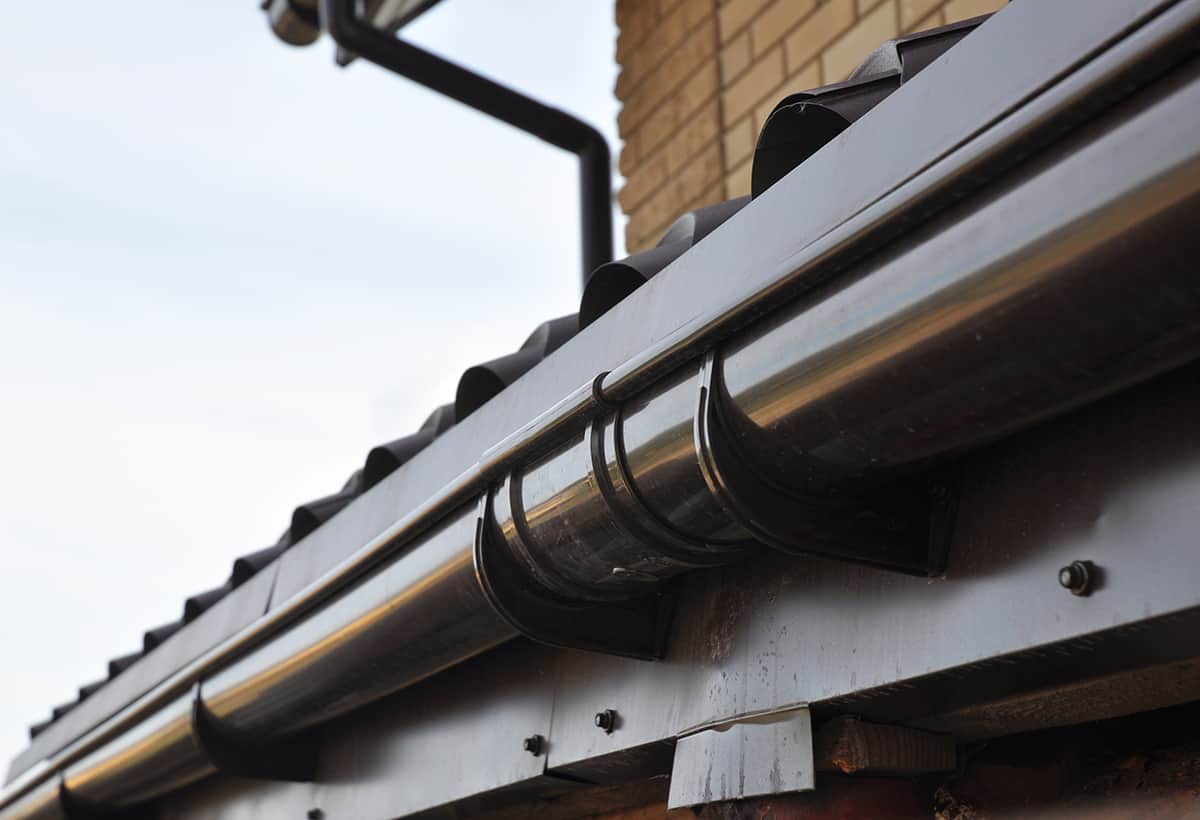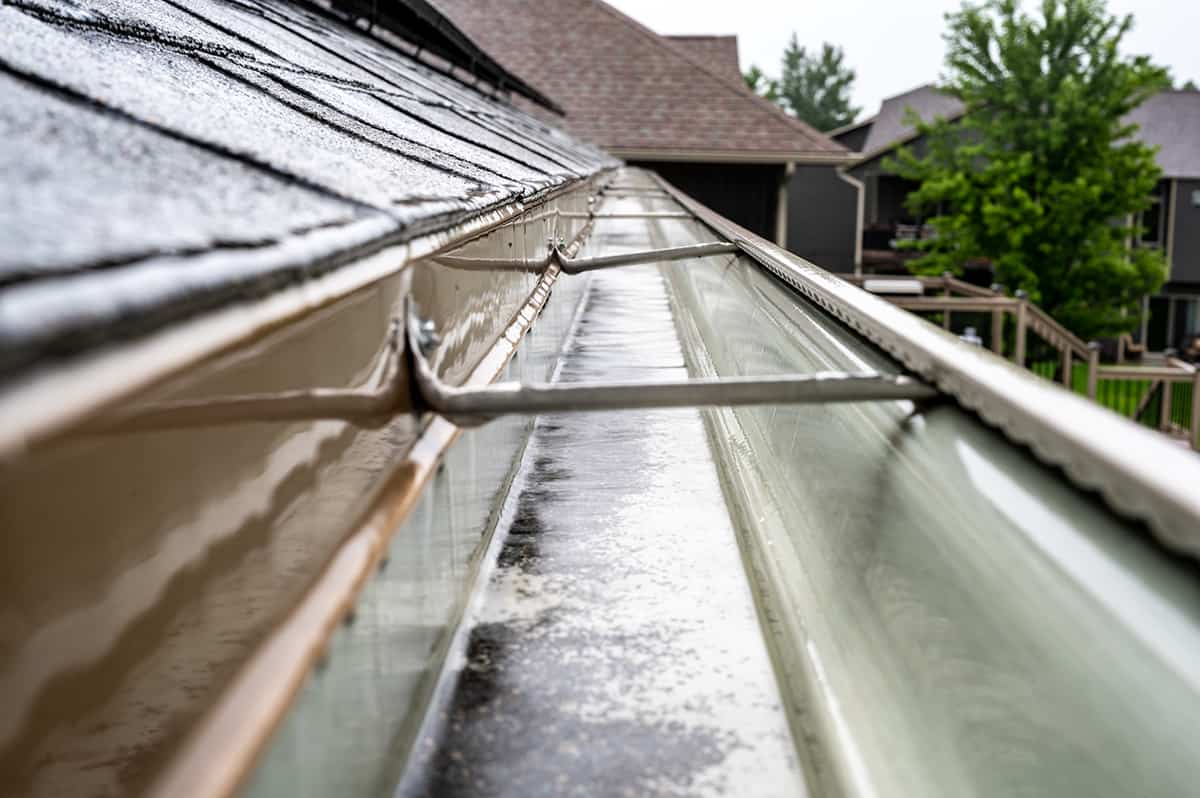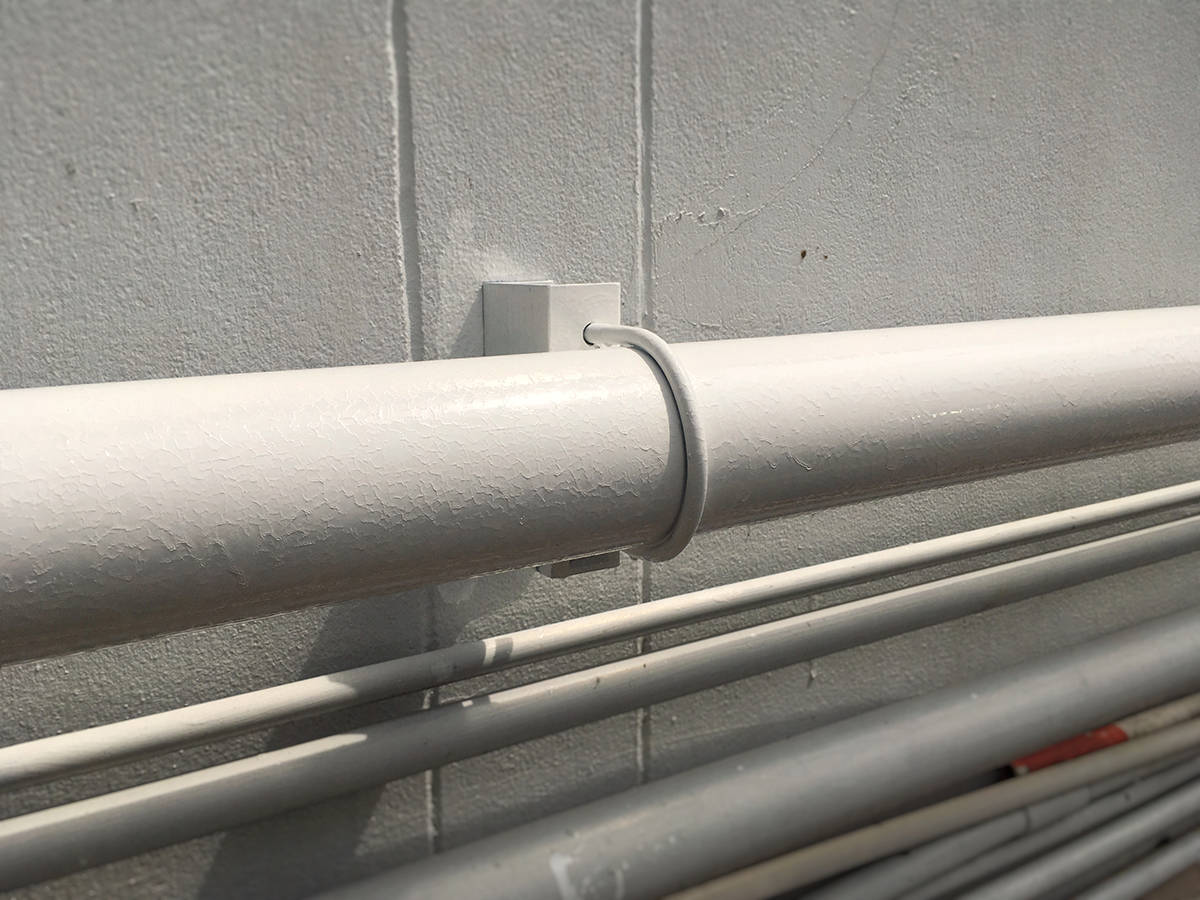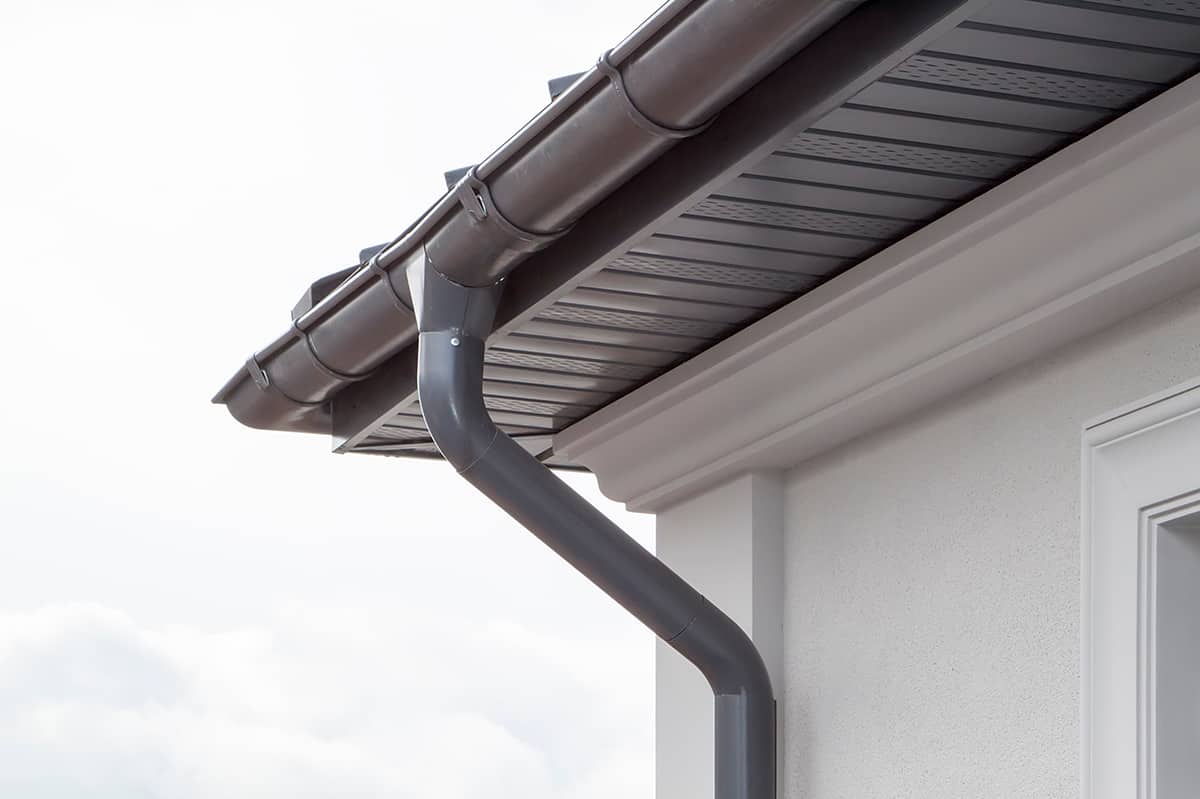When it comes to gutter installation, using the right type of gutter hangers is essential to ensure proper support, stability, and longevity of your gutter system.
Gutter hangers are the hardware components that attach the gutters to the fascia board or other mounting surfaces. They come in various styles and materials, each designed to accommodate different gutter types and installation requirements.
This article explores various gutter hanger types and explains how to choose the right gutter hangers for your home.
Table of Contents
Gutter Hanger Types
Spike and Ferrule Hangers
Spike and ferrule hangers are one of the traditional methods of gutter attachment. A spike is driven through the front of the gutter, securing it to a cylindrical ferrule placed inside the gutter.
The ferrule provides support and prevents the spike from crushing the gutter. While easy to install, these hangers may become loose over time due to weather conditions and gutter expansion and contraction.
Hidden Hangers
Hidden hangers, also known as concealed hangers, are designed to provide a sleek and seamless appearance. They are attached to the fascia board and then clipped onto the back of the gutter.
Hidden hangers provide better support and are less likely to cause damage to the gutter compared to spike and ferrule hangers.
Bracket Hangers
Bracket hangers are versatile and come in various styles, including strap brackets and T-bar brackets. Strap brackets wrap around the gutter and are secured to the fascia, while T-bar brackets provide a more secure connection by sliding into the gutter and screwing into the fascia. Bracket hangers offer sturdy support and are suitable for different types of gutter materials.
K-Style Hangers
K-style gutter hangers are specifically designed for K-style gutters, which have a decorative shape that resembles crown molding. These hangers are often hidden from view when the gutter is installed, contributing to a clean and attractive finish.
Half-Round Gutter Hangers
Half-round gutter hangers are designed to support half-round gutters, which have a rounded cross-section. These hangers are typically attached to the fascia or roof using screws, nails, or other fasteners.
Snap-in Hangers
Snap-in hangers are a convenient option that allows you to snap the gutter into place. They are often used for vinyl gutters and provide a secure hold while being relatively easy to install.
Fascia Hangers
Fascia hangers are installed directly onto the fascia board. They provide a strong attachment point for the gutter and are available in various designs, including those that allow for expansion and contraction of the gutter.
Rafters or Roof Hangers
Rafters or roof hangers provide additional support by attaching the gutter directly to the roof structure. This type of hanger is particularly useful in areas with heavy snow loads or for gutters that need extra stability.
Strap Hangers
Strap hangers are long pieces of metal that are wrapped around the gutter and attached to the fascia or other mounting surfaces. They provide ample support and can help distribute the weight of the gutter more evenly.
How to Choose Gutter Hangers
Choosing the right gutter hangers is a crucial step in ensuring the stability and effectiveness of your gutter system. The type of hangers you select will depend on various factors, including the type of gutter you have, the local weather conditions, and your installation preferences.
Understand Your Gutter Type
Different gutter hangers are designed to accommodate specific gutter profiles. Determine whether you have K-style gutters, half-round gutters, or another style. This information will narrow down your options and ensure compatibility.
Assess Your Fascia or Mounting Surface
Examine the fascia board or mounting surface where the gutter will be attached. Consider its material and condition. This will help you choose hangers that are suitable for the specific surface and provide a secure attachment.
Consider Local Weather Conditions
Take into account the climate in your area. If you experience heavy rainfall, snow, or ice, you’ll need hangers that can withstand the added weight and potential stress.
Hangers that provide solid support and prevent gutter sagging are essential in regions with harsh weather. In climates that do not experience extreme weather conditions, you will have a broader choice of gutter hangers to select from, since these won’t need to be as sturdy or durable.
Evaluate Installation Difficulty
Consider your level of DIY expertise and the ease of installation for different hanger types. Some hangers, like hidden hangers or snap-in hangers, are relatively easy to install and provide a clean look.
Others, such as spike and ferrule hangers, may be more traditional but require more effort. Understanding whether or not you’re going to be able to install the hangers yourself or if you need to hire a professional can help you decide which types of gutter hangers are going to be best for you.
Research Hanger Materials
Gutter hangers come in various materials, including aluminum, steel, plastic, and more. Each material has its advantages and durability. Aluminum hangers, for example, are lightweight and resistant to corrosion, making them a popular choice.
Weight Capacity and Spacing
Determine the weight capacity of the hangers and their recommended spacing. Heavier gutters may require more frequent hanger placement to ensure proper support. Consult manufacturer guidelines for specific weight and spacing recommendations.
Aesthetic Considerations
If appearance is important to you, choose hangers that provide a clean and unobtrusive look. Hidden hangers or fascia hangers are often preferred for their minimal visibility.
Read Reviews and Recommendations
Online reviews and recommendations from other homeowners or DIY enthusiasts can offer valuable insights into the performance and durability of different hanger types and brands.
It can be especially useful to consult friends and family members if they have recently had new guttering or new gutter hangers installed. Recommendations for trusty and reliable local tradespeople can be relied upon more than reviews you might find online.
Budget Considerations
While it’s important to prioritize quality, consider your budget as well. Compare the costs of different hanger options and choose the best balance between quality and affordability.
Gutter Hanger Materials
Gutter hangers are made from a variety of materials, each with its own set of characteristics and advantages. The choice of material for gutter hangers depends on factors such as durability, corrosion resistance, weight-bearing capacity, and aesthetics.
Aluminum
Aluminum is a popular choice for gutter hangers due to its lightweight nature, corrosion resistance, and durability. It is widely used in various types of gutter hangers, including hidden hangers, strap hangers, and more. Aluminum hangers are relatively easy to install and are suitable for most climates.
Steel
Steel hangers provide robust support and are known for their strength. They are often used in areas with heavy snow loads or where added durability is required. Galvanized steel hangers are treated to resist corrosion, while stainless steel hangers offer even higher corrosion resistance.
Steel gutter hangers can be more expensive compared with other hanger materials, but they will pay off in the long run since they can last a long time and offer increased durability.
Copper
Copper hangers are chosen for their elegant appearance and natural resistance to corrosion. They are often used in high-end or historic homes where aesthetics are a priority. While more expensive than other options, copper hangers develop a beautiful patina over time to give a really unique look to a property.
Vinyl or PVC
Vinyl or PVC gutter hangers are lightweight and resistant to rust and corrosion. They are commonly used for vinyl gutter systems and are suitable for areas with milder weather conditions.
Vinyl hangers may be a cost-effective option for DIY installations because they are more budget-friendly than metal gutter hangers, and they are also very easy to use in conjunction with PVC guttering.
Zinc
Zinc hangers are similar to galvanized steel, and they offer corrosion resistance. They are a budget-friendly alternative to stainless steel hangers and are often used in regions with moderate weather conditions where they won’t need to stand up to heavy rain or snow.
Composite Materials
Some hangers are made from composite materials, which can combine the benefits of different materials, such as strength, durability, and corrosion resistance.
These hangers may be engineered to withstand specific environmental conditions. Composite materials are typically among the most expensive options when it comes to gutter hangers, but they can be considered cost-effective since they are long-lasting.
Gutter Hanger Cost
The cost of gutter hangers can vary widely depending on the material, type, brand, and quantity you need for your gutter installation.
Spike and Ferrule Hangers
These gutter hangers are the most affordable, costing between $0.10 to $0.50 per hanger.
Hidden Hangers
Hidden hangers typically cost between $1 to $2 per hanger.
Bracket Hangers
Bracket hangers, such as strap brackets or T-bar brackets, can range from $1 to $3 per hanger.
K-Style Hangers
K-style gutter hangers are designed specifically for K-style gutters and can cost around $1 to $2 per hanger.
Half-Round Gutter Hangers
Half-round gutter hangers, designed for half-round gutters, are generally priced between $1 to $3 per hanger.
Fascia Hangers
Fascia hangers attach directly to the fascia board and may cost around $1 to $2 per hanger.



